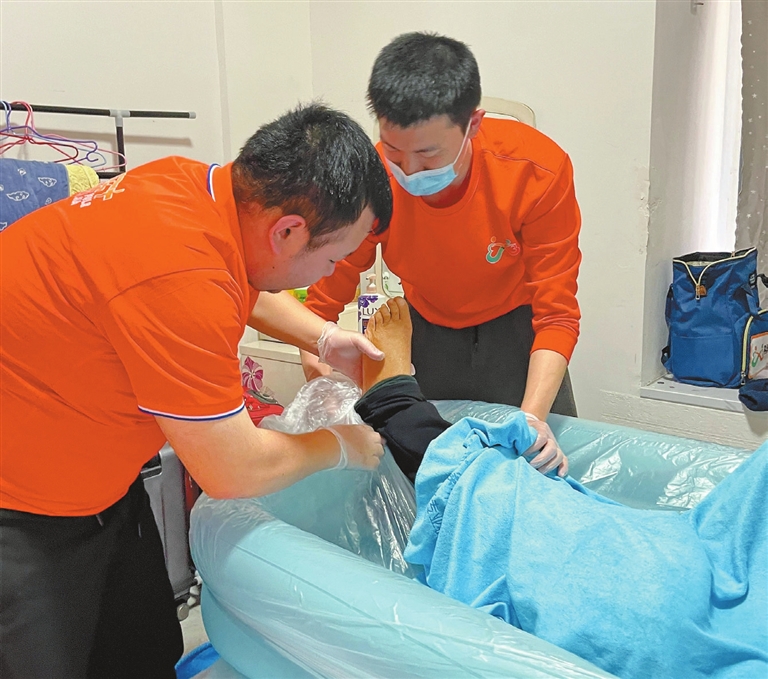
WITH great care, Yan Yangjunqi helped an elderly man get into the bathtub and continued their conversation as he assisted him during the bath. “Grandpa, would you please let me know by blinking if the water is too hot?” he inquired, ensuring his comfort and safety. The old man is a Parkinson’s patient, making him unable to communicate verbally, and he was not biologically related to Yan. Yan, 29, is a bath assistant offering support to the elderly community. To date, he has aided more than 200 seniors with their bathing needs, demonstrating his unwavering commitment to their well-being. Like Yan, there’s an emerging trend among young people who are getting involved in China’s elderly care industry, infusing it with vitality and fresh perspectives. Yan was working as a mass media professional in Beijing, before returning to his hometown Chengdu in Sichuan Province. Explaining the reason behind delving into the elderly welfare sector, he said his childhood experiences had influenced his decision. When he was young, he used to live with his grandparents. “They seldom took shower after they turned 70 because the bathroom was dark and slippery and they were afraid of getting injured,” he said. “I thought that I should do something to improve seniors’ life,” Yan said, adding that he then made up his mind to change a job. Unlike Yan, Wang Cheng, 27, chose to study senior service and management in college, before landing a job in the social welfare center of the Yangpu District in Shanghai. When asked why he chose to become a senior care worker, Wang confidently asserted that his youth is his advantage. According to him, young people have a passion for learning and the courage to explore new ideas. “During the stage of life resembling that of their own grandchildren, it becomes easier to establish deep emotional connections with the elderly to provide better services.” Reflecting on a particular experience, Wang recounted an instance when he was assisting an elderly man. Once Wang was on leave and the old man had refused to eat, which prompted him to return immediately. “Upon seeing me he instantly smiled,” Wang said. “In that moment, I felt obliged to continue serving in the elderly care industry.” According to him, the number of Gen Zers working in his social welfare center has increased over the past five years. In a poll by the social media platform Sina Weibo conducted earlier this year, more than 60% of the 40,000-plus respondents said they believe that the pension industry “is promising” and they would like to give it a try if possible. China has an increasingly aging population. Data shows that there were 280 million people aged 60 and above in China at the end of 2022, accounting for 19.8% of the entire population. The figure is expected to exceed 300 million by 2025, and 400 million by around 2035. The country is expected to have a relatively sound institutional system in place by 2025, covering its entire elderly population, according to an official document released in May. Measures have been taken by local governments to encourage young people to get involved in the pension industry. For instance, in 2020, Beijing began giving one-off rewards of up to 60,000 yuan (US$8,365) to college graduates who take a job in the pension industry, and subsidies to professional caretakers for seniors. Wang was awarded Shanghai’s household registration status after becoming a caretaker. It is a favorable policy by the Yangpu District to attract talents into the pension industry. In the Furuiyuan nursing home in Xuchang, Henan Province, Zhang Fengqin, 67, was enthusiastically preparing for a nationwide e-sports competition with her teammates. “Our team of seniors beat the young players in the city-level competitions and won the group championship,” she said with pride, asking Fan Jinlin, head of the nursing home, to show the certificate. Fan, 26, is in charge of four nursing homes. “I pay more attention to the spiritual life of the elderly people, and I hope that nursing homes could be a joyous place for them,” he said. While taking care of the seniors, Fan and his team usually create short videos and play games with them. Their social media posts have attracted more than 1 million viewers, and have helped change people’s perspectives of nursing homes and fostered better understanding. “The novel things not only bring happiness to the seniors but also bridge the gap across generations, making them feel young again,” Fan said. (Xinhua) | 
